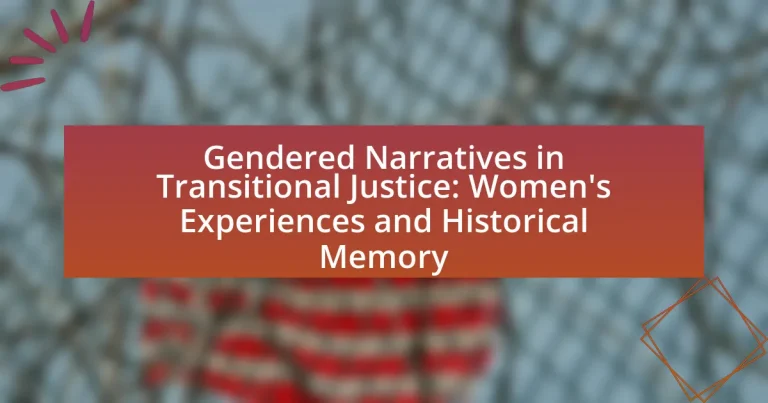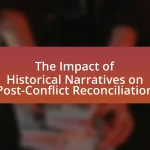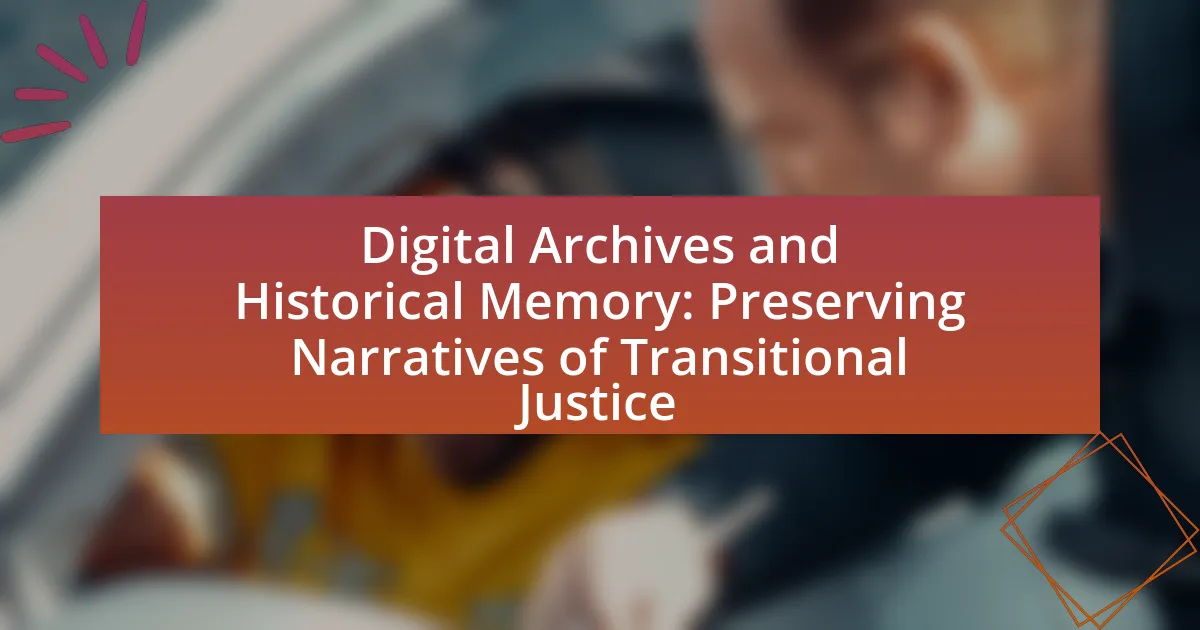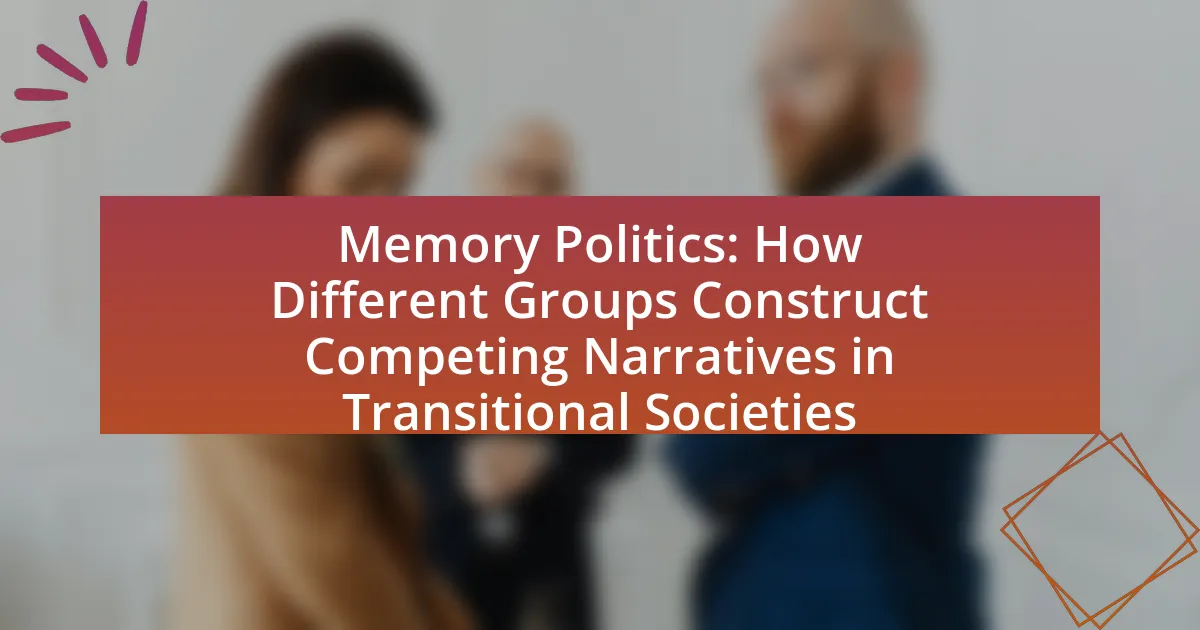Gendered narratives in transitional justice focus on how gender shapes the experiences and interpretations of justice processes following conflict or repression, particularly emphasizing women’s unique experiences of violence and trauma. The article explores the significance of integrating gender perspectives in transitional justice frameworks, highlighting the challenges women face, such as marginalization and systemic barriers, which hinder their participation and recognition. It discusses the importance of historical memory in acknowledging women’s roles and experiences, the implications for future justice processes, and best practices for enhancing women’s involvement in these mechanisms. The article underscores the necessity of adopting gender-sensitive policies to ensure that women’s voices are included and their specific needs addressed in transitional justice initiatives.
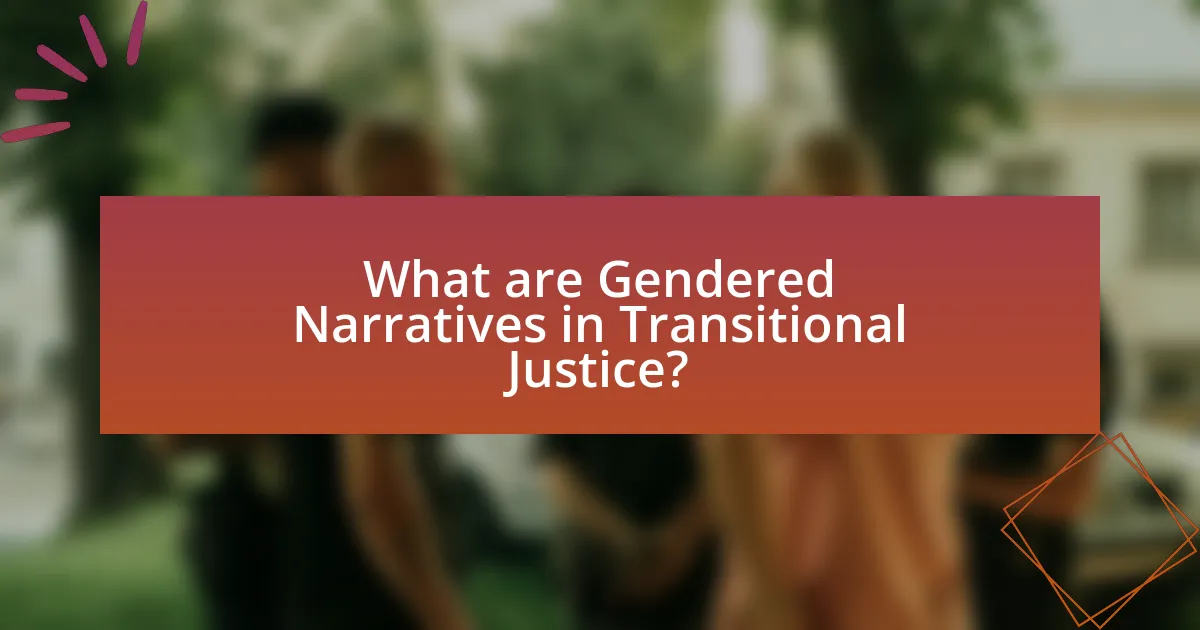
What are Gendered Narratives in Transitional Justice?
Gendered narratives in transitional justice refer to the ways in which gender influences the experiences, representations, and interpretations of justice processes following conflict or repression. These narratives highlight how women’s experiences of violence, trauma, and recovery differ from men’s, often emphasizing the need for inclusive approaches that address specific gender-based harms. Research indicates that traditional justice mechanisms frequently overlook women’s perspectives, leading to incomplete historical accounts and inadequate reparations. For instance, the United Nations Security Council Resolution 1325 emphasizes the importance of integrating gender perspectives in peace and security efforts, underscoring the necessity of recognizing women’s roles and experiences in transitional justice frameworks.
How do gendered narratives shape the understanding of transitional justice?
Gendered narratives significantly shape the understanding of transitional justice by highlighting the distinct experiences and needs of women in post-conflict societies. These narratives reveal how gender-based violence and discrimination are often overlooked in traditional justice frameworks, which tend to focus on political and military aspects of conflict. For instance, the United Nations Security Council Resolution 1325 emphasizes the importance of women’s participation in peace processes and the need to address sexual violence in conflict, illustrating that gendered perspectives are essential for comprehensive justice. By integrating women’s voices and experiences, transitional justice mechanisms can better address the root causes of conflict and promote healing and reconciliation within communities.
What role do women’s experiences play in these narratives?
Women’s experiences serve as crucial elements in narratives of transitional justice, highlighting the unique impacts of conflict and societal change on female populations. These experiences provide insight into the gendered dimensions of violence, trauma, and resilience, often revealing how women navigate and respond to injustices. For instance, studies show that women’s testimonies can challenge dominant historical narratives, bringing attention to issues such as sexual violence and displacement that are frequently overlooked. This inclusion not only enriches the understanding of historical memory but also fosters a more comprehensive approach to justice that acknowledges the specific needs and rights of women in post-conflict societies.
How do societal norms influence gendered narratives in transitional justice?
Societal norms significantly shape gendered narratives in transitional justice by dictating the roles and expectations of different genders during conflict and post-conflict processes. These norms often marginalize women’s experiences, framing them primarily as victims rather than active participants in justice processes. For instance, in many cultures, traditional views may prioritize male narratives, leading to a historical bias that overlooks women’s contributions to peacebuilding and reconciliation. Research indicates that when societal norms emphasize patriarchal values, women’s voices are frequently excluded from formal justice mechanisms, as seen in the aftermath of conflicts in countries like Rwanda and Bosnia, where women’s testimonies were often sidelined despite their critical roles in community recovery. This exclusion not only affects the representation of women’s experiences but also impacts the overall effectiveness of transitional justice by failing to address the full scope of harm experienced by all genders.
Why is historical memory important in the context of gendered narratives?
Historical memory is crucial in the context of gendered narratives because it shapes the understanding and recognition of women’s experiences in historical events. By preserving and acknowledging these narratives, societies can address the gendered dimensions of trauma and injustice, ensuring that women’s voices are included in the collective memory. For instance, research shows that in post-conflict societies, such as Rwanda, the inclusion of women’s experiences in historical accounts has led to more comprehensive transitional justice processes, highlighting the need for gender-sensitive approaches. This recognition not only validates women’s experiences but also promotes social healing and equality, making historical memory a vital component in the discourse surrounding gendered narratives.
How does historical memory affect women’s roles in transitional justice?
Historical memory significantly influences women’s roles in transitional justice by shaping the narratives and recognition of their experiences during conflict. Women’s contributions and victimization are often marginalized in historical accounts, which can lead to their exclusion from formal justice processes. For instance, in post-conflict societies like Rwanda, the acknowledgment of women’s roles in both perpetration and victimization has been crucial for inclusive justice mechanisms, as seen in the Gacaca courts that aimed to address gender-specific crimes. This historical context not only validates women’s experiences but also empowers them to participate actively in transitional justice initiatives, ensuring that their voices are heard and their needs addressed.
What are the implications of historical memory on future justice processes?
Historical memory significantly influences future justice processes by shaping societal perceptions of past injustices and informing the frameworks through which justice is sought. For instance, collective memories of gender-based violence during conflicts can lead to the prioritization of women’s rights in transitional justice mechanisms, as seen in the post-conflict contexts of Rwanda and Bosnia, where women’s testimonies were crucial in addressing sexual violence. This emphasis on historical memory can also foster a sense of legitimacy and trust in justice processes, as communities recognize their experiences are acknowledged and validated. Furthermore, historical memory can guide policymakers in designing inclusive justice frameworks that address the specific needs of marginalized groups, thereby enhancing the effectiveness and fairness of future justice initiatives.
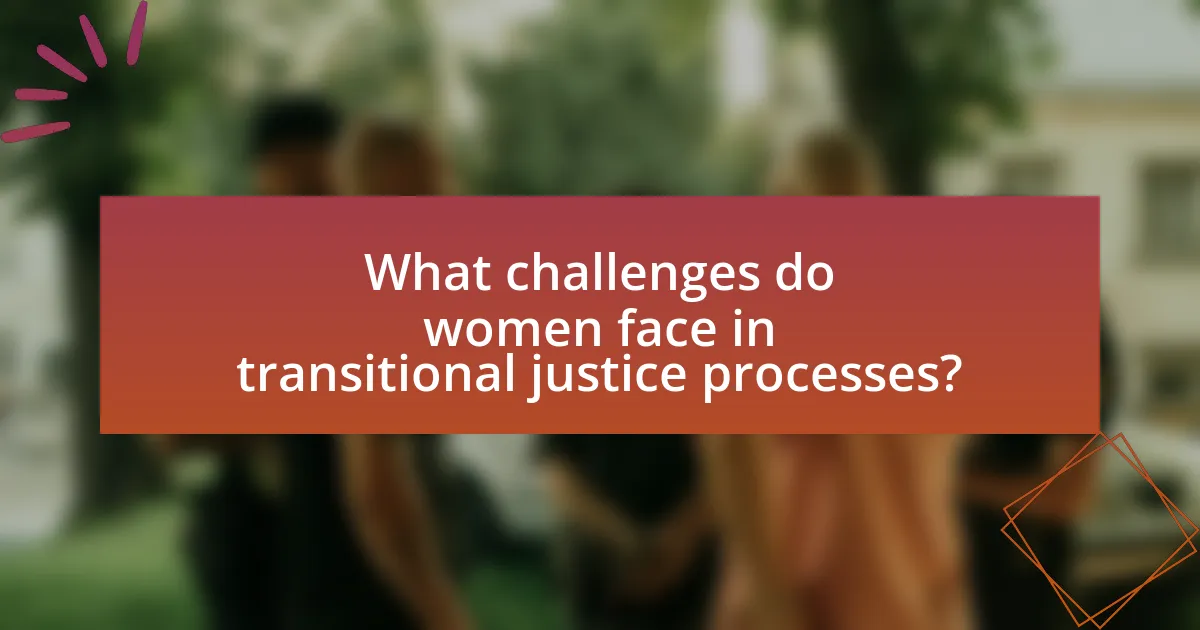
What challenges do women face in transitional justice processes?
Women face significant challenges in transitional justice processes, including marginalization, lack of representation, and inadequate attention to gender-specific needs. Marginalization occurs as women’s voices and experiences are often overlooked in favor of dominant narratives that prioritize male perspectives. This is evidenced by the fact that women constitute only a small percentage of participants in peace negotiations and truth commissions, limiting their influence on outcomes. Additionally, transitional justice mechanisms frequently fail to address issues such as sexual violence and gender discrimination, which disproportionately affect women. For instance, a study by the United Nations indicates that sexual violence is a common tactic in conflict, yet it remains underreported and inadequately addressed in many transitional justice frameworks. These challenges hinder women’s ability to achieve justice and recognition in post-conflict societies.
How do systemic barriers impact women’s participation in transitional justice?
Systemic barriers significantly hinder women’s participation in transitional justice by perpetuating gender inequalities and limiting access to decision-making processes. These barriers include cultural norms that prioritize male voices, legal frameworks that do not adequately protect women’s rights, and a lack of resources for women’s organizations. For instance, research by the United Nations indicates that women represent only 22% of peace negotiators, highlighting the underrepresentation caused by these systemic obstacles. Additionally, studies show that transitional justice mechanisms often fail to address gender-specific crimes, further marginalizing women’s experiences and voices in the justice process.
What specific obstacles do women encounter in seeking justice?
Women encounter several specific obstacles in seeking justice, including societal stigma, lack of access to legal resources, and systemic biases within the judicial system. Societal stigma often leads to victim-blaming, discouraging women from reporting crimes such as sexual violence. Additionally, many women face financial barriers that limit their ability to access legal representation, as studies indicate that legal fees can be prohibitively expensive. Systemic biases within the judicial system can result in a lack of sensitivity towards women’s issues, leading to inadequate investigations and dismissive attitudes from law enforcement and legal professionals. For instance, research by the United Nations indicates that women are often treated with skepticism when they report crimes, which can further hinder their pursuit of justice.
How can these barriers be addressed to improve women’s experiences?
To address barriers and improve women’s experiences in transitional justice, implementing gender-sensitive policies and practices is essential. These policies should include the active participation of women in decision-making processes, ensuring their voices are heard and represented. Research indicates that when women are involved in peace negotiations, the likelihood of sustainable peace increases by 35% (UN Women, 2015). Additionally, providing targeted support services, such as legal aid and psychological counseling, can help women navigate the complexities of transitional justice systems. Furthermore, raising awareness and educating communities about gender-based violence and discrimination can foster a more inclusive environment. By integrating these strategies, the barriers women face can be effectively reduced, leading to improved experiences in transitional justice contexts.
What is the significance of women’s testimonies in transitional justice?
Women’s testimonies in transitional justice are significant because they provide essential insights into gender-specific experiences of violence and injustice during conflicts. These testimonies highlight the unique impacts of war on women, such as sexual violence and displacement, which are often overlooked in traditional narratives. By including women’s voices, transitional justice mechanisms can ensure a more comprehensive understanding of the conflict’s effects, leading to more effective reparations and policy changes. Research shows that when women’s experiences are acknowledged, it fosters societal healing and promotes gender equality, as evidenced by the United Nations Security Council Resolution 1325, which emphasizes the importance of women’s participation in peace processes.
How do women’s testimonies contribute to historical memory?
Women’s testimonies significantly contribute to historical memory by providing unique perspectives that often challenge dominant narratives. These accounts highlight the experiences and roles of women in historical events, ensuring that their voices are included in the collective memory. For instance, during conflicts, women’s testimonies can reveal the impact of war on civilian life, including sexual violence and displacement, which are frequently overlooked in male-centric historical accounts. Research indicates that integrating women’s experiences into historical narratives not only enriches the understanding of events but also fosters a more inclusive and accurate representation of history, as seen in the documentation of women’s roles in the Rwandan Genocide and the Bosnian War.
What challenges do women face when sharing their testimonies?
Women face significant challenges when sharing their testimonies, including societal stigma, fear of retribution, and lack of support. Societal stigma often leads to victim-blaming, which discourages women from speaking out. Fear of retribution can stem from potential backlash from perpetrators or community members, creating a hostile environment for disclosure. Additionally, a lack of institutional support, such as inadequate legal protections or unsympathetic audiences, further complicates the process of sharing their experiences. Research indicates that these barriers can lead to underreporting of incidents and a silencing of women’s voices in transitional justice contexts, as highlighted in studies on gendered narratives in historical memory.
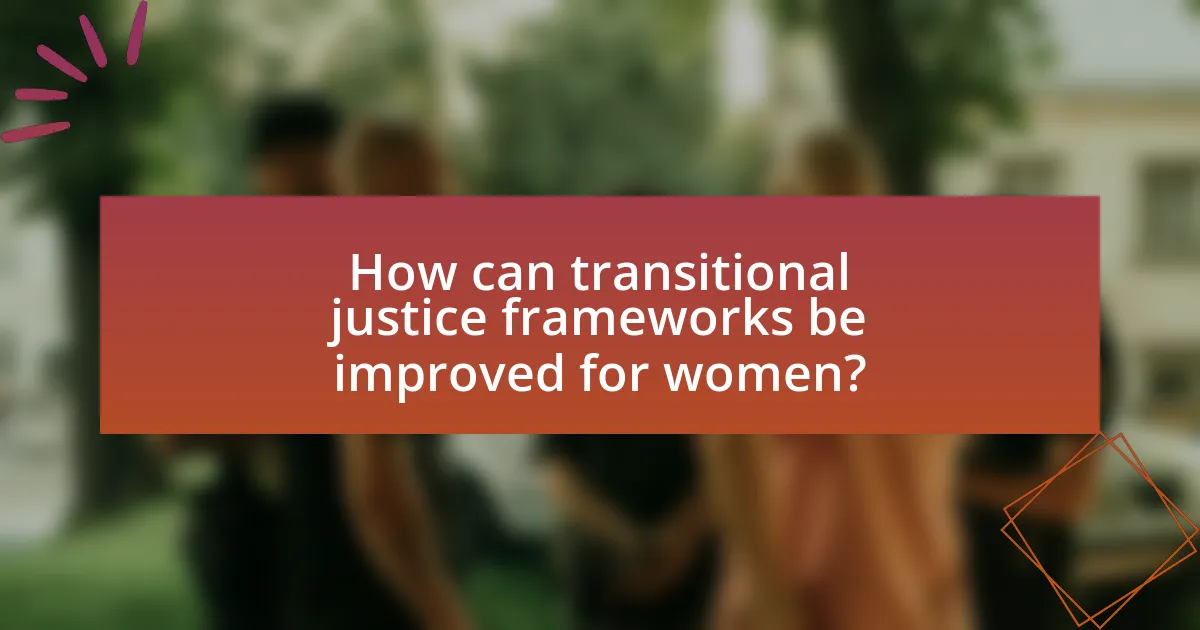
How can transitional justice frameworks be improved for women?
Transitional justice frameworks can be improved for women by integrating gender-sensitive approaches that address the specific needs and experiences of women affected by conflict. This includes ensuring women’s participation in decision-making processes, which has been shown to enhance the effectiveness of transitional justice mechanisms. For instance, the UN Security Council Resolution 1325 emphasizes the importance of women’s involvement in peace and security efforts, highlighting that their perspectives lead to more comprehensive and inclusive outcomes. Additionally, frameworks should incorporate measures that specifically address sexual and gender-based violence, recognizing it as a critical aspect of transitional justice. Research indicates that when women’s experiences are acknowledged and addressed, it fosters healing and reconciliation within communities.
What best practices exist for integrating gender perspectives in transitional justice?
Best practices for integrating gender perspectives in transitional justice include ensuring women’s participation in decision-making processes, addressing gender-specific harms, and incorporating gender analysis in truth-seeking mechanisms. Women’s involvement in transitional justice processes leads to more comprehensive and representative outcomes, as evidenced by the UN Security Council Resolution 1325, which emphasizes the importance of women’s participation in peace and security efforts. Additionally, recognizing and documenting gender-based violence as a distinct category of harm ensures that the unique experiences of women are acknowledged and addressed, as highlighted in various reports from organizations like the International Criminal Court. Implementing gender-sensitive training for justice personnel further enhances the effectiveness of transitional justice mechanisms by fostering an understanding of gender issues and their implications in post-conflict societies.
How can policies be designed to support women’s experiences in transitional justice?
Policies can be designed to support women’s experiences in transitional justice by incorporating gender-sensitive frameworks that prioritize women’s voices and needs. This can be achieved through the establishment of inclusive mechanisms that ensure women’s participation in decision-making processes, such as truth commissions and reparations programs. Evidence from various transitional justice contexts, such as the post-conflict reconstruction in Rwanda, demonstrates that women’s involvement leads to more comprehensive and effective justice outcomes, as it addresses specific gender-based violence and discrimination experienced during conflict. Additionally, policies should mandate the collection of gender-disaggregated data to inform the development of targeted interventions that address the unique challenges faced by women in transitional settings.
What role do international organizations play in promoting gender-sensitive approaches?
International organizations play a crucial role in promoting gender-sensitive approaches by establishing frameworks and guidelines that prioritize gender equality in various sectors. For instance, the United Nations has implemented resolutions such as UN Security Council Resolution 1325, which emphasizes the importance of women’s participation in peace and security processes. These organizations also provide funding and technical assistance to member states to develop policies that address gender disparities, ensuring that women’s voices are included in decision-making processes. Furthermore, they conduct research and disseminate best practices to raise awareness about gender issues, thereby influencing national and local policies to adopt gender-sensitive measures.
What lessons can be learned from successful gendered narratives in transitional justice?
Successful gendered narratives in transitional justice highlight the importance of inclusivity and representation in addressing historical injustices. These narratives demonstrate that incorporating women’s experiences leads to more comprehensive and effective justice processes. For instance, the Truth and Reconciliation Commission in South Africa acknowledged gender-based violence, which allowed for a broader understanding of the conflict’s impact on women, ultimately fostering healing and societal reconciliation. Additionally, successful gendered narratives emphasize the need for survivor-centered approaches, ensuring that women’s voices are prioritized in the justice process, as seen in the International Criminal Court’s focus on sexual violence as a war crime. These lessons underscore that recognizing and validating women’s experiences not only enhances the legitimacy of transitional justice mechanisms but also contributes to sustainable peace and societal transformation.
How have specific case studies illustrated effective gender integration?
Specific case studies have illustrated effective gender integration by showcasing successful initiatives that incorporate women’s perspectives and experiences in transitional justice processes. For instance, the case study of the Truth and Reconciliation Commission in South Africa highlighted the importance of including women’s testimonies, which led to a more comprehensive understanding of the impacts of apartheid on different genders. This inclusion resulted in policy recommendations that addressed gender-specific violence and discrimination, demonstrating how women’s voices can shape justice outcomes. Additionally, the case of the International Criminal Tribunal for the former Yugoslavia (ICTY) emphasized the prosecution of sexual violence as a war crime, which was a significant step in recognizing gender-based violence in conflict settings. These examples underscore that effective gender integration not only enhances the legitimacy of transitional justice mechanisms but also ensures that the needs and rights of women are adequately addressed.
What strategies can be adopted from these case studies for future initiatives?
Strategies that can be adopted from case studies in gendered narratives within transitional justice include integrating women’s perspectives into policy-making and ensuring their active participation in peace processes. Research indicates that when women’s experiences are included, the outcomes of transitional justice initiatives are more comprehensive and effective. For instance, the United Nations Security Council Resolution 1325 emphasizes the importance of women’s involvement in peace and security, demonstrating that inclusive approaches lead to more sustainable resolutions. Additionally, documenting and preserving women’s narratives can enhance historical memory and contribute to a more equitable society, as evidenced by various successful initiatives in post-conflict settings that prioritize women’s voices.
What practical steps can be taken to enhance women’s experiences in transitional justice?
To enhance women’s experiences in transitional justice, it is essential to implement gender-sensitive policies and practices. These policies should include the establishment of women-led organizations that advocate for women’s rights and representation in transitional justice processes. Research indicates that when women are involved in peace negotiations, the resulting agreements are 35% more likely to last at least 15 years (UN Women, “Women, Peace and Security: The Global Study on the Implementation of United Nations Security Council Resolution 1325,” 2015). Additionally, integrating gender training for all personnel involved in transitional justice can ensure that women’s specific needs and experiences are recognized and addressed. Furthermore, creating safe spaces for women to share their narratives can empower them and contribute to a more inclusive historical memory.
